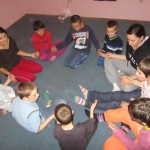By Sanja Elezovic, RDDC/Bosnia-Herzegovina
July 29, 2012
“Children are not mean, so don’t try to fix them; instead, let’s change our attitude towards them.”
Sometimes I wonder what is the purpose of so many rules, regulations and laws – especially when these are only idealized lines written in a blind ink by someone else. We write down, we read, we highlight, we repeat and we give more attention to the written word rather than look around ourselves and realize what goes on in the world. My words, which might seem unclear or not defined, refer to all possible rights and privileges that are taken as “holy” and, speaking in legal terms, guaranteed to every child no matter what differences exist between them. Then, I look around and I see children unjustly treated by the society they live in. It is not always the case of society’s unjust treatment; it is also happening in families where children are not treated fairly due to ignorance.
My intention is not to take sides in these relations; I just want to draw attention to these relations the way I see and feel them in my own city. My attitude towards social and family issues has roots in my experience, the knowledge in social work I gained through my education, and the practical work and logical critical thinking about today’s world based on firm facts. What comes up in my mind is a sentence, a result of long-term scientific and practical work by our experts, including a respectable professor at my own university: “There is no mean child, only an unhappy one” (J. Janković).
The more I gain practical work as a social worker and an ordinary citizen of this city, state, continent, the Earth – the more I realize this sentence is true. This is especially the case when I work with children at Egipatsko Selo. When a child does not behave as he should – saying mean things to others, getting into quarrels and fights – I hear myself judging that child and labelling him as “bad” after awhile. Afterwards, I ask myself: “Am I really this kind of person? The one that points fingers and gives up on children?” Those thoughts really strike me and I fight myself in order to see that child as a product of inadequate care, neglect and the lack of emotional support. I try to walk in their shoes and think of myself as a child that has been moved from one fosterhome to another, a child that had to accept different rules by different foster people at the same time – and no matter what they did, nobody in charge would care. This is so much chaos during the key period of children’s development.
The thing that always helps me while thinking about these children is that they behave unconsciously and do not do anything on purpose to me or other members of my team and our dance group. They behave like this because they lack the necessary education and upbringing due to their particular social environment. They “play the role” because the role has been given to them through a negative environment. When I try to explain to other people that there is a lot more to it than just devious behaviour, they do not hear me or do not want to hear. They want to believe the problem lies somewhere else. If everybody would make less effort in changing and fixing children, and instead, just become a responsible adult towards them, I believe that new generations would be healthier and more self-confident.
I’m glad to say that we make little steps through our dance program towards this goal because we are not judgmental or critical; we encourage and listen to them. I think these are important characteristics of every social relation, which must be improved. What makes me happy every day at Egipatsko Selo is when I see that a “bad” boy actively participates in our practice, helping others to learn pas de chat, laughing and spending his time in a positive environment. Nothing compares to the feeling of joy when I see them not giving up despite obstacles in their way, not getting angry if they cannot accomplish something in the beginning, but continually going on with a smile on their face.
Don’t you think that this is one of the most important life lessons? We are trying to change our attitude on a daily basis because it is not a constant and should be actively monitored and improved. It is important to be brave enough to look inside yourself!
Sanja Elezovic is the lead youth dance instructor for RDDC’s program in Mostar, Bosnia-Herzegovina. She was born in Mostar and has a Bachelor’s Degree in Social Work.
